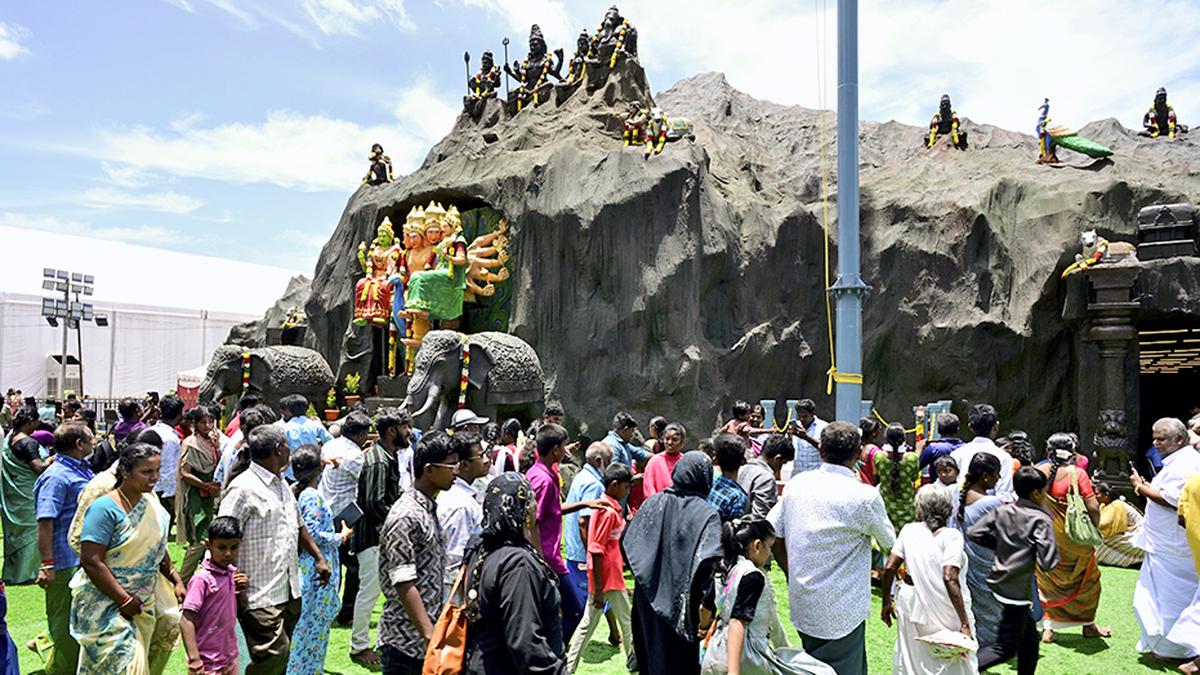A section of visitors at an exhibition hall during the Muthamizh Murugan International Conference held at Palani in Tamil Nadu’s Dindigul district on August 25, 2024.
| Photo Credit: G. Karthikeyan
Has the Dravida Munnetra Kazhagam (DMK) government invoked Muruga, the god of Tamils, as an antidote to the Bharatiya Janata Party (BJP)’s Rama cult? This is the question being asked in Tamil Nadu after certain resolutions were adopted at the just-concluded Muthamizh Murugan International Conference, organised by the Hindu Religious and Charitable Endowments (HR&CE) Department.
The resolutions include holding a competition for students of schools and colleges run by the HR&CE Department on Murugan bhakti literature; and getting students to recite the Kantha Sasti Kavasam, a devotional song on Muruga, during the six-day Kantha Sasti festival.
Muruga, an ancient deity of Tamils since the Sangam period, who was worshipped as Seyon, has become an integral part of Hinduism. He is worshipped as the son of Shiva and Parvathi and the nephew of Vishnu. He is no longer just a Tamil god.
The allies of the DMK, particularly the Communist Party of India (Marxist) and the Viduthalai Chiruthaigal Katchi, criticised the conference and the resolutions. Only R. Mutharasan, the State secretary of the CPI, supported the event, saying it cannot be seen as an affront to secularism. He pointed out that the HR&CE Department had existed since the days of the Justice Party, the predecessor of the Dravidar Kazhagam and other Dravidian parties.
Ever since the DMK came to power and P.K. Sekarbabu, an ardent devotee who regularly visits Sabarimala, was appointed as Minister of HR&CE, the Department began working overtime. The DMK needed a Minister like Mr. Sekarbabu to counter its anti-Hindu and atheist image. This need became all the more urgent after the BJP won the Lok Sabha elections again in 2019, and the number of people flocking to the national party in Tamil Nadu surged. Those who were earlier silent about their faith started becoming more vocal. The DMK also had to keep in mind that its arch rival, the All India Anna Dravida Munnetra Kazhagam (AIADMK), is a party of believers.
Tamil Nadu Chief Minister M.K. Stalin, who had ridiculed certain Hindu customs, also sought to do some damage control by saying that the DMK is not anti-Hindu. “There is no truth to the allegation that this party is anti-Hindu. The BJP, the RSS, and the Hindu Munnani seek to portray the DMK as anti-Hindu. That is not the truth. In fact, there is no temple which is not visited by my wife. Many district secretaries of the DMK sport kumkumam on their forehead and we do not criticise their faith,” he said, while participating in the Pongal festival in 2021. His argument is supported by the fact that several DMK leaders regularly visit temples and wear their faith on their sleeve. Nowadays, more and more DMK MLAs go to the Assembly sporting religious symbols, which was more common among the AIADMK MLAs.
However, some DMK leaders, such as A. Raja, continue to be critical of Hindu religion and the Sanathana Dharma that is espoused by the BJP. Mr. Stalin’s son, Udhayanidhi Stalin, who is the Minister of Youth Welfare and Sports Development, found himself in the midst of a massive controversy in 2023 for his comments on Sanathana Dharma and faces a slew of cases in various States for his remarks.
The DMK, an offshoot of the atheist Dravidar Kazhagam, is having to walk a tightrope between its core ideology and its leaders and supporters who are believers. Earlier, its leaders could castigate Hindu religious faith, among others, and walk away. They can no longer do that, with the emergence of the BJP on the national scene. Ridiculing Hindu gods is no longer tolerated in films and literature: lyricist Vairamuthu, for instance, faced a backlash for his comments in 2018 on Andal, a Vaishnavite minstrel.
A secular government cannot afford to identify itself with any religion. However, as long as the Tamil Nadu government keeps the management and administration of temples under its control through the HR&CE Department, it is obligated to fulfill certain responsibilities. That is why Mr. Stalin and Mr. Udhayanidhi Stalin, despite their personal beliefs, participated in the Conference. The DMK is not the Dravidar Kazhagam. DMK founder C.N. Annadurai had said, ‘Ontre Kulam Oruvane Devan (One community, one god)’. At the end of the day, the DMK is a political party and requires the votes of every section of society.
